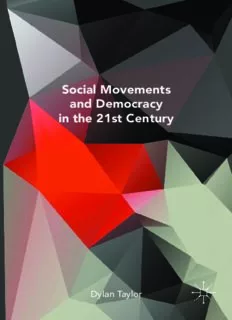
Social Movements and Democracy in the 21st Century PDF
Preview Social Movements and Democracy in the 21st Century
Social Movements and Democracy in the 21st Century Dylan Taylor Social Movements and Democracy in the 21st Century Dylan Taylor Social Movements and Democracy in the 21st Century Dylan Taylor Victoria University of Wellington Wellington, New Zealand ISBN 978-3-319-39683-5 ISBN 978-3-319-39684-2 (eBook) DOI 10.1007/978-3-319-39684-2 Library of Congress Control Number: 2016959631 © The Editor(s) (if applicable) and The Author(s) 2017 This work is subject to copyright. All rights are solely and exclusively licensed by the Publisher, whether the whole or part of the material is concerned, specifically the rights of translation, reprinting, reuse of illustrations, recitation, broadcasting, reproduction on microfilms or in any other physical way, and trans- mission or information storage and retrieval, electronic adaptation, computer software, or by similar or dissimilar methodology now known or hereafter developed. The use of general descriptive names, registered names, trademarks, service marks, etc. in this publication does not imply, even in the absence of a specific statement, that such names are exempt from the relevant protective laws and regulations and therefore free for general use. The publisher, the authors and the editors are safe to assume that the advice and information in this book are believed to be true and accurate at the date of publication. Neither the publisher nor the authors or the editors give a warranty, express or implied, with respect to the material contained herein or for any errors or omissions that may have been made. Printed on acid-free paper This Palgrave Macmillan imprint is published by Springer Nature The registered company is Springer International Publishing AG The registered company address is: Gewerbestrasse 11, 6330 Cham, Switzerland For Anna Taylor Acknowledgments I am immensely grateful to Colin Cremin. Never overbearing, always critically engaged and pushing me when I needed to be pushed. The work undertaken in these pages was possible because of his support and supervision. This book also benefitted greatly from the input of Steve Matthewman. His generosity of spirit, attention to detail and critical verve were invaluable throughout. I am deeply indebted to Chamsy el-Ojeili for his advice, insights and ongoing intellectual support and friendship. I am thankful to Erin Taylor and Mark Derby for proofreading and editing earlier drafts of this project (and for being such fine communards), and to Benjamin H. Snyder and Greta Snyder for their critical engage- ment with sections of this work. I benefitted greatly from Brett Nicholls and Patricia Nickel’s feedback on an earlier version of this work. The input from the anonymous reviewers for Palgrave Macmillan further helped this project along. I am very grateful to the help offered by Sharla Plant and Amelia Derkatsch from Palgrave Macmillan as I worked on this book. I have greatly appreciated the Department of Sociology at University of Auckland, and the School of Social and Cultural Studies at Victoria University of Wellington, for having provided stimulating intellectual environments throughout. The editorial board of Counterfutures: Left Thought and Practice Aotearoa—Sue Bradford, Tim Corballis, Chamsy vii viii Acknowledgments el-Ojeili, Sean Phelan and Warwick Tie—have contributed to an intel- lectual and political environment from which I have benefitted greatly. I am grateful to my mother and father, Christine and Adrian Taylor, for providing a writing retreat in Kaikoura and for having always been supportive parents. If I were to thank all the other friends and family members, colleagues and students who have supported and inspired me over the years I worked on this project, I would seriously jeopardise (an already stretched) word limit. I hope you all know who you are. I can never be thankful enough to my partner, Anna Taylor, for her love and support, and to whom this book is dedicated. Contents 1 Introduction: Confronting the Crisis of Democracy 1 Part I Situating Contestation 13 2 The Arc of Contention 15 3 Rethinking Social Movements 51 4 The Dynamics of Capital 71 5 Reconceptualising Political Strategy 99 Part II Contesting the Twenty-First Century: An Analysis of Occupy 127 6 Occupy, Democracy, and Enduring Change 129 ix x Contents 7 The Subject of Change 163 8 Locating Effective Resistance 193 Part III Claiming the Twenty-First Century 221 9 Reconceptualising Effective Action 223 10 Conclusion: Overcoming the Crisis of Democracy 253 Bibliography 261 Index 287 List of Tables Table 6.1 Occupy’s targets and areas of concern 133 Table 6.2 Occupy’s economic targets 134 Table 7.1 Claims made on behalf of specific groups 180 Table 8.1 Occupy’s actions 206 xi
Description: